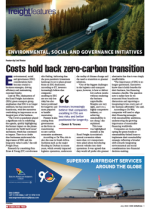Environmental, social and governance (ESG) considerations have become crucial to business strategies, driving efficiency and maintaining customer loyalty. Liesl de Wet, chairperson of the Road Freight Association (RFA) green transport group, emphasises that ESG is no longer sidelined, but has entered the boardroom, with few executives overlooking its importance as an integral part of the business."The Covid-19 pandemic played a significant role in redefining the agenda, quickly highlighting the human impact on the planet. It spurred the 'build back better' movement, which has continued to impact. There is no doubt that businesses understand the importance of ESG and the long-term value it adds,” she told Freight News.Research by consulting firm Ernst & Young (EY) corroborates this finding, indicating that the post-pandemic investment landscape is set to place greater focus on ESG disclosures. According to EY, investors increasingly believe that companies excelling in ESG are not only less risky but also better positioned for longevity and more prepared to handle uncertainty.Pressure is also coming from governments as the focus on transitioning to zero-carbon economies accelerates.According to De Wet, this is also the case in South Africa. Incidents such as the major f looding in Durban in recent years, which severely impacted logistics operations, underscore the reality of climate change and the need to transition to greener solutions."One of the biggest challenges in the logistics and transport space, however, is how to deliver low-carbon results without rendering the business unprofitable. Margins are very tight, and it is a highly competitive industry, so achieving sustainability is not cheap," she explained.This issue was highlighted recently at the Road Freight Association’s annual convention where more than 150 transporters were asked about introducing electric vehicles into their operations. It was agreed that they would all prefer this greener alternative but that it was simply unaffordable.“The importance of ESG is no longer questioned. Executives know that it holds benefits for their business, but financing remains a hurdle. The question now is rather how do we transcend from boardroom discussions and reporting to integrating it into every part of the business affordably,” she said.According to De Wet, companies will need to align their financing strategies with sustainability ambitions, underscoring the growing importance of sustainable financing worldwide.Companies are increasingly opting for green bonds or sustainability-linked loans to implement their sustainability strategy, ref lecting a broader shift towards integrating environmental and social considerations into financial decision-making.

